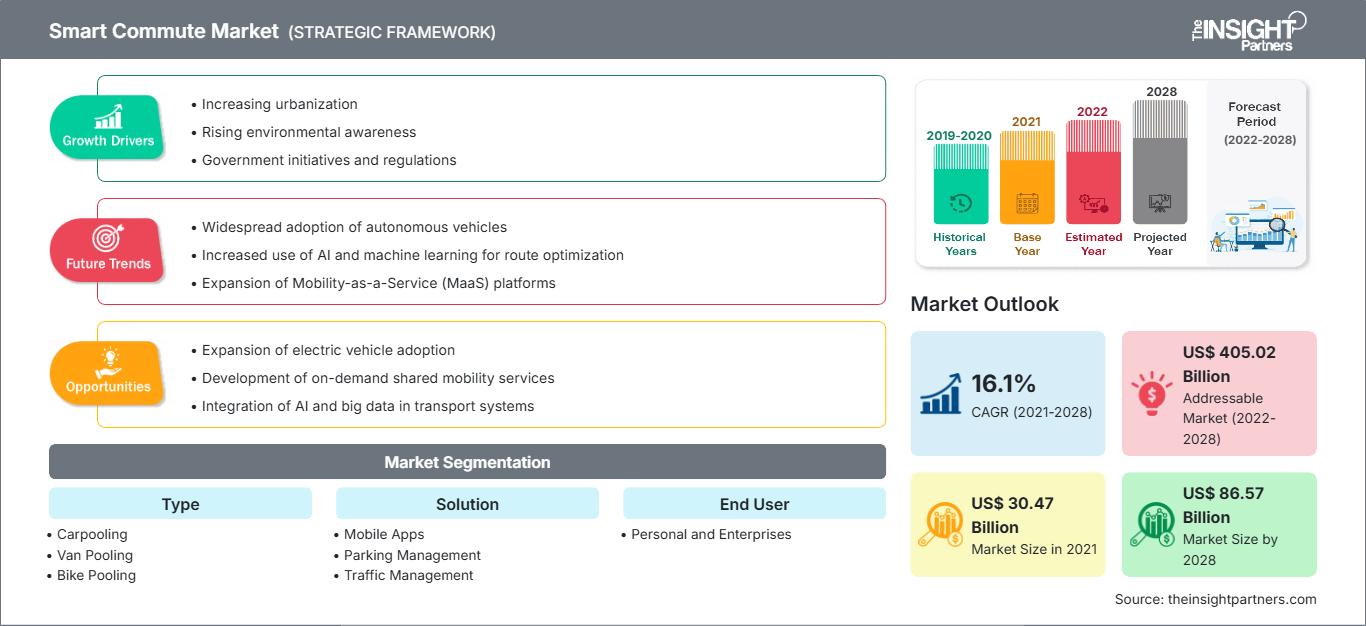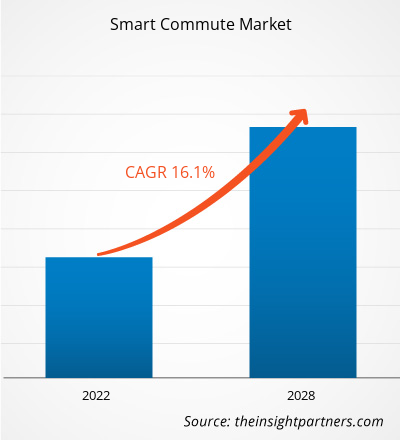Smart Commute Market Overview and Growth by 2028
Smart Commute Market Forecast to 2028 - Analysis By Type (Carpooling, Van Pooling, Bike Pooling, Metro, and Others), Solution (Mobile Apps, Parking Management, Traffic Management, and Others), and End User (Personal and Enterprises)
Historic Data: 2019-2020 | Base Year: 2021 | Forecast Period: 2022-2028- Report Date : Apr 2022
- Report Code : TIPRE00009536
- Category : Automotive and Transportation
- Status : Published
- Available Report Formats :


- No. of Pages : 155
The smart commute market is expected to grow from US$ 30,469.49 million in 2021 to US$ 86,568.73 million by 2028; it is estimated to grow at a CAGR of 16.1% from 2021 to 2028.
Smart commuting is defined as regularly traveling via carpooling, vanpooling, biking, bicyclists, or taking the metro. Public transit companies, governments, and other stakeholders have developed a complete strategy that considers smart travel and shares it with the public to construct more powerful transportation in metropolitan regions. Smart commuting positively impacts the environment by decreasing traffic congestion and reducing greenhouse gas emissions.
Carpooling, bike-sharing, vanpooling, and other environmental-friendly commuting options are available through smart commute services. It provides office workers with a transportation option to choose a more effective commute path that reduces traffic congestion and transportation expenditures. One of the factors boosting the growth of the smart commute market is the growing number of city dwellers, leading to an increase in generational rates. Sharing transportation services have gained universal acceptability and are being encouraged by governments and environmental bodies as it helps reduce emissions. It allows for fewer private autos, which is expected to fuel the growth of the smart commute market in the coming years.
In North America, the need for smart commutes has been fuelled by an increasing preference for carpool services among office commuters which would alleviate traffic congestion and prevent environmental damage. Furthermore, a rise in the tourism industry, technological advancements, and favorable government policies are other factors driving the growth of the North America smart commute market. In Europe, the rise in the trend of mobility-as-a-service and the increase in the user base of ride-sharing services are expected to create lucrative opportunities for the market players.
In Europe, due to growing concerns about global warming, road congestion, and reliance on foreign energy, smart commuters are becoming more popular. The practice of levying toll rates on automobiles with a single occupant, which was imposed in 2012, has resulted in a huge increase in the use of smart commutes by European consumers.
Customize This Report To Suit Your Requirement
Get FREE CUSTOMIZATIONSmart Commute Market: Strategic Insights

-
Get Top Key Market Trends of this report.This FREE sample will include data analysis, ranging from market trends to estimates and forecasts.
Impact of COVID-19 Pandemic on Smart Commute Market
The COVID-19 outbreak had a significant impact on the transportation sector. The demand for carpooling and vanpooling services reduced globally in 2020 due to the COVID-19. The worldwide smart commute market saw a considerable decline in revenue generation in 2020 compared to 2019, partly due to the lockdowns and customers' reluctance to use ride-sharing services even after the regulations were lifted. Ride-sharing firms are always attempting to maintain driver and passenger confidence in terms of safety and sanitation.
Market Insights– Smart Commute Market
Increasing Trend of Mobility-as-a-Service
People who are not capable of purchasing a car can experience seamless travel through mobility services. According to the Bureau of Transportation Statistics, the average cost of owning and operating a vehicle is roughly $8,858, assuming 15,000 kilometers of drive per year. Mobility-as-a-service reduces these costs for the user by maximizing the use of transportation services such as carpooling and ride-hailing. It also reduces traffic congestion and overall automobile emissions in cities. As a result, digitally-enabled carpooling and ride-hailing efficiently manage transport demands and provide a convenient and environmentally friendly alternative to private automobile ownership. Moreover, according to statistics, 55% of the world's population currently lives in cities, and estimations suggest that by 2050, roughly 68% of the population will be living in cities. The rapid pace of urbanization is already leading to traffic congestion. The mobility as a service (MaaS) concept may be a better choice for reducing traffic congestion by making greater use of existing public and private transportation infrastructure. The urgent demand for effective solutions to handle traffic in smart cities in a faster, less expensive, and more convenient manner is expected to fuel MaaS market growth by 2028. Therefore, the increasing trend of mobility as a Service (MaaS) is expected to fuel the growth of the global smart commute market.
Type-Based Smart Commute Market Insights
Based on type, the smart commute market is segmented into carpooling, vanpooling, bike pooling, metro, and others. The carpooling segment is anticipated to hold a significant share in the global smart commute market, and it is expected to grow at the highest CAGR. The smart commute is defined as regularly traveling from one point to another via carpooling, vanpooling, biking, bicyclists, or taking the metro.
Solution-Based Smart Commute Market Insights
Based on solution, the smart commute market is segmented into mobile apps, parking management, traffic management, and others. The mobile apps segment is anticipated to hold a significant share in the global smart commute market, and it is expected to grow at the highest CAGR. There is a growing usage of mobile applications in automobile travel mode to reduce travel time, cost, and vehicle emissions.
End User-Based Smart Commute Market Insights
Based on end user, the smart commute market is bifurcated into personal and enterprises. The enterprises segment is anticipated to hold a significant share in the global smart commute market, and it is expected to grow at a higher CAGR.
Smart Commute
Smart Commute Market Regional InsightsThe regional trends and factors influencing the Smart Commute Market throughout the forecast period have been thoroughly explained by the analysts at The Insight Partners. This section also discusses Smart Commute Market segments and geography across North America, Europe, Asia Pacific, Middle East and Africa, and South and Central America.
Smart Commute Market Report Scope
| Report Attribute | Details |
|---|---|
| Market size in 2021 | US$ 30.47 Billion |
| Market Size by 2028 | US$ 86.57 Billion |
| Global CAGR (2021 - 2028) | 16.1% |
| Historical Data | 2019-2020 |
| Forecast period | 2022-2028 |
| Segments Covered |
By Type
|
| Regions and Countries Covered |
North America
|
| Market leaders and key company profiles |
|
Smart Commute Market Players Density: Understanding Its Impact on Business Dynamics
The Smart Commute Market is growing rapidly, driven by increasing end-user demand due to factors such as evolving consumer preferences, technological advancements, and greater awareness of the product's benefits. As demand rises, businesses are expanding their offerings, innovating to meet consumer needs, and capitalizing on emerging trends, which further fuels market growth.

Players operating in the smart commute market are mainly focused on the development of advanced and efficient products.
- In January 2022, Tummoc, a multi-modal mobility firm, intends to expand operations to ten other cities by 2022, including Delhi and Mumbai.
- In April 2021, A city-based mobility firm has built an app platform that integrates routes with prices for the first time, combining the bus, metro, Uber, Yulu, and other last-mile choices.
Company Profiled
:- BlaBlaCar
- CommuteSmart
- Enterprise Holdings Inc
- ePoolers Technologies Pvt. Ltd
- Golden Concord Holdings Limited
- Oakland Smart Commute
- Quick Ride
- Transhelp Technologies Pvt Ltd
- Uber Technologies Inc.
- Smart Commute
Frequently Asked Questions
Naveen is an experienced market research and consulting professional with over 9 years of expertise across custom, syndicated, and consulting projects. Currently serving as Associate Vice President, he has successfully managed stakeholders across the project value chain and has authored over 100 research reports and 30+ consulting assignments. His work spans across industrial and government projects, contributing significantly to client success and data-driven decision-making.
Naveen holds an Engineering degree in Electronics & Communication from VTU, Karnataka, and an MBA in Marketing & Operations from Manipal University. He has been an active IEEE member for 9 years, participating in conferences, technical symposiums, and volunteering at both section and regional levels. Prior to his current role, he worked as an Associate Strategic Consultant at IndustryARC and as an Industrial Server Consultant at Hewlett Packard (HP Global).
- Historical Analysis (2 Years), Base Year, Forecast (7 Years) with CAGR
- PEST and SWOT Analysis
- Market Size Value / Volume - Global, Regional, Country
- Industry and Competitive Landscape
- Excel Dataset
Recent Reports
Testimonials
The Insight Partners' SCADA System Market report is comprehensive, with valuable insights on current trends and future forecasts. The team was highly professional, responsive, and supportive throughout. We are very satisfied and highly recommend their services.
RAN KEDEM Partner, Reali Technologies LTDsI requested a report on a very specific software market and the team produced the report in a few days. The information was very relevant and well presented. I then requested some changes and additions to the report. The team was again very responsive and I got the final report in less than a week.
JEAN-HERVE JENN Chairman, Future AnalyticaWe worked with The Insight Partners for an important market study and forecast. They gave us clear insights into opportunities and risks, which helped shape our plans. Their research was easy to use and based on solid data. It helped us make smart, confident decisions. We highly recommend them.
PIYUSH NAGPAL Sr. Vice President, High Beam GlobalThe Insight Partners delivered insightful, well-structured market research with strong domain expertise. Their team was professional and responsive throughout. The user-friendly website made accessing industry reports seamless. We highly recommend them for reliable, high-quality research services
YUKIHIKO ADACHI CEO, Deep Blue, LLC.This is the first time I have purchased a market report from The Insight Partners.While I was unsure at first, I visited their web site and felt more comfortable to take the risk and purchase a market report.I am completely satisfied with the quality of the report and customer service. I had several questions and comments with the initial report, but after a couple of dialogs over email with their analyst I believe I have a report that I can use as input to our strategic planning process.Thank you so much for taking the extra time and making this a positive experience.I will definitely recommend your service to others and you will be my first call when we need further market data.
JOHN SUZUKI President and Chief Executive Officer, Board Director, BK TechnologiesI wish to appreciate your support and the professionalism you displayed in the course of attending to my request for information regarding to infectious disease IVD market in Nigeria. I appreciate your patience, your guidance, and the fact that you were willing to offer a discount, which eventually made it possible for us to close a deal. I look forward to engaging The Insight Partners in the future, all thanks to the impression you have created in me as a result of this first encounter.
DR CHIJIOKE ONYIA MANAGING DIRECTOR, PineCrest Healthcare Ltd.Reason to Buy
- Informed Decision-Making
- Understanding Market Dynamics
- Competitive Analysis
- Identifying Emerging Markets
- Customer Insights
- Market Forecasts
- Risk Mitigation
- Boosting Operational Efficiency
- Strategic Planning
- Investment Justification
- Tracking Industry Innovations
- Aligning with Regulatory Trends





 Get Free Sample For
Get Free Sample For